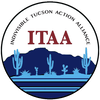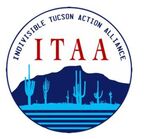Indivisible Tucson Action Alliance
Meeting Notes
February 3, 2020
Announcements—Due to the substantial number of first time attendees, Dana asked newcomers to introduce themselves and comment on what prompted them to attend. The consensus among them seemed to be that they were particularly motivated by the events of the past week in the Senate. Helen Herziger, of Indivisible and Strong, gave a preview of the topics her group would be covering in their next meeting, including the voter rights petition drive and the need for automatic registration. She also announced a change in the meeting time for her group: 4th Thurs of each month at 5:30 at St. Francis in the Foothills at Swan and River. She reminded us that if the ITAA meeting times were a conflict for some members, her group provided another option. She also announced a Watch Party for the Feb. 25 debate at Brother John’s, time TBA.
Kathleen made a correction to a previously announced date for the next State Team meeting at Eileen’s house. The correct information is: Wed. February 26th at 4:30.
There was an announcement (purely offered as information not endorsement) that the Bloomberg Bus was holding an event at Brother John’s at noon on Wednesday and that there would be free barbecue.
The Feb. meeting was packed with handouts, information, and resources for members. Misty directed members to our website www.indivisibletucson.org. Members are urged to visit this site for a calendar of upcoming events and other volunteer resources, such as RTS training (covered in this meeting).
GUEST SPEAKER –Rex Scott spoke to members about his campaign as a candidate for Pima County Supervisor, District One. He began with some personal details, that he is a retired educator after a career as a middle school teacher and 19 years as an administrator as both an assistant principal and principal. He noted that the job of a county governing body was to oversee a diverse population, and this is quite like the job of school administrators. Government officials must serve all the residents, not favor one constituency, as is the practice of the current occupant (Ally Miller) of the seat he is running for. Mr. Scott discussed the duties of a supervisor, including setting tax rates, approving budgets for services, and overseeing the vital work of flood control, library and Health department funding, and (possibly topmost on voters’ minds), road improvements. The current occupant of this seat is an advocate for the “pay as you go” approach to funding projects, which advocates the withholding of capital improvements until they can be paid with funds already available. Thus bonds or taxes would not be an option for necessary capital improvements. The trouble with the “pay as you go” philosophy is that necessary improvements can be put off to the detriment of current residents, especially as our infrastructure suffers, and the state of our roads is a prime example. The state gas tax (known as HURF or Highway User Revenue Fund) has not been adjusted since 1991, and that is the revenue that is used for road improvements. At the conclusion of his presentation, Dana noted the particular need for county candidates to rely on donations since they do not qualify for the Clean Election subsidy.
Meeting Notes
February 3, 2020
Announcements—Due to the substantial number of first time attendees, Dana asked newcomers to introduce themselves and comment on what prompted them to attend. The consensus among them seemed to be that they were particularly motivated by the events of the past week in the Senate. Helen Herziger, of Indivisible and Strong, gave a preview of the topics her group would be covering in their next meeting, including the voter rights petition drive and the need for automatic registration. She also announced a change in the meeting time for her group: 4th Thurs of each month at 5:30 at St. Francis in the Foothills at Swan and River. She reminded us that if the ITAA meeting times were a conflict for some members, her group provided another option. She also announced a Watch Party for the Feb. 25 debate at Brother John’s, time TBA.
Kathleen made a correction to a previously announced date for the next State Team meeting at Eileen’s house. The correct information is: Wed. February 26th at 4:30.
There was an announcement (purely offered as information not endorsement) that the Bloomberg Bus was holding an event at Brother John’s at noon on Wednesday and that there would be free barbecue.
The Feb. meeting was packed with handouts, information, and resources for members. Misty directed members to our website www.indivisibletucson.org. Members are urged to visit this site for a calendar of upcoming events and other volunteer resources, such as RTS training (covered in this meeting).
GUEST SPEAKER –Rex Scott spoke to members about his campaign as a candidate for Pima County Supervisor, District One. He began with some personal details, that he is a retired educator after a career as a middle school teacher and 19 years as an administrator as both an assistant principal and principal. He noted that the job of a county governing body was to oversee a diverse population, and this is quite like the job of school administrators. Government officials must serve all the residents, not favor one constituency, as is the practice of the current occupant (Ally Miller) of the seat he is running for. Mr. Scott discussed the duties of a supervisor, including setting tax rates, approving budgets for services, and overseeing the vital work of flood control, library and Health department funding, and (possibly topmost on voters’ minds), road improvements. The current occupant of this seat is an advocate for the “pay as you go” approach to funding projects, which advocates the withholding of capital improvements until they can be paid with funds already available. Thus bonds or taxes would not be an option for necessary capital improvements. The trouble with the “pay as you go” philosophy is that necessary improvements can be put off to the detriment of current residents, especially as our infrastructure suffers, and the state of our roads is a prime example. The state gas tax (known as HURF or Highway User Revenue Fund) has not been adjusted since 1991, and that is the revenue that is used for road improvements. At the conclusion of his presentation, Dana noted the particular need for county candidates to rely on donations since they do not qualify for the Clean Election subsidy.

